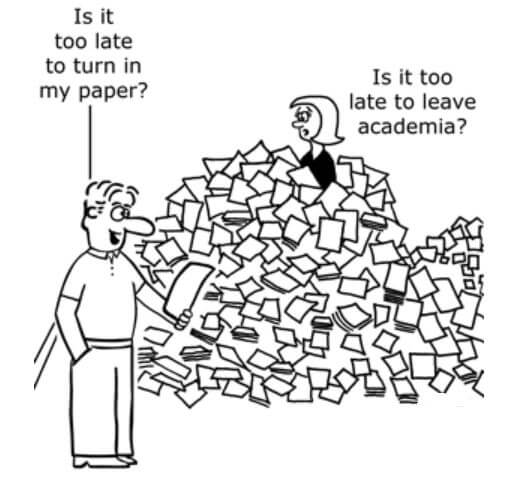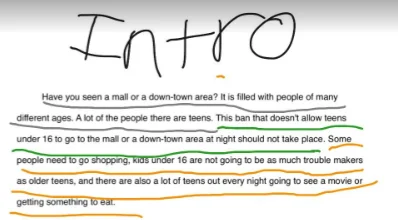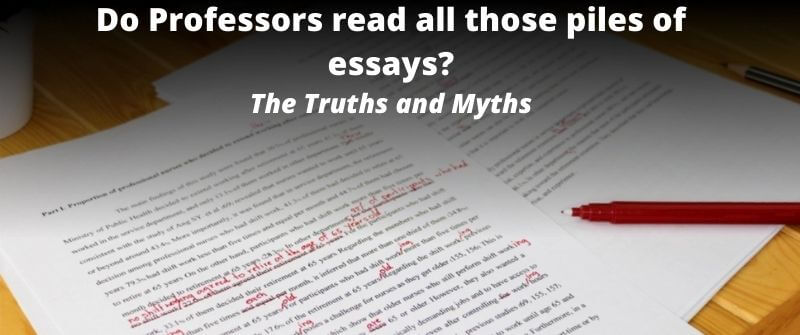Have you ever wondered whether your professors actually read the papers that you wrote and the essays that you present? Well, you are not alone. A large number of students have reported doubting this.
In this guide, we will explore exactly that and give the reasons why most profs do their job right and the excuses given by those who do not.
In most universities, professors get overwhelmed by the work, and there may have a temptation to let go some work. However, it is their job to read all the paper and essays written by their students.
Ideally, most professors read papers to make sure that the students met the requirements of the assignment. Others read papers to gauge the understanding of the students on certain topics.
However, some other lecturers don’t read all papers, especially when the task is too many largely because of negligence.
It is good to note that we are all humans, and some are lazy. Therefore, some professors read papers to check on punctuation, grammar, and spelling. Others read the papers because it is their job and they are paid to do it.
Those who do not read feel that if they read all papers concentrating on each one of them, they will just read a few and be unable to concentrate on the rest.
Therefore, we can say the answer is two ways. Some professors usually read papers and others don’t. There are ways that professors use to speed up the reading of papers. Some choose to read the abstract.
How Professors Speed up reading Essays when Marking
The abstract summarizes the key points of the article. This enables professors to easily judge the relevance of the article. Professors also scan papers to finish reading them quickly. A type of scanning mostly used is the ladder reading.
The professor reads the abstract, conclusion, and the first line of every paragraph. This will guide the professor on whether he needs to continue reading the paper or not.

Some professors don’t read submitted papers if they are not original. Once the professor checks for plagiarism in your work and finds it present he or she doesn’t read your paper.
Professors are experienced and have come across all sorts of content. If your work is a repetition of what has been presented previously then the professor is unlikely to read your work.
Do Professors check or read the Sources?
Professors who read your paper check the sources of your information. If the content in your work is new, the professor will want to know where it is from. Professors also check sources of claims that are not credible.
Papers with few citations are also frequently checked by professors to determine whether there is information that is presented and not cited.
Professors who have taught for many years will know whether the source of some information presented by the student is true or not by just looking at it. They have come across the sources severally.
Do professors actually count words in essays?
Most professors don’t count words. What they do count are the pages. In the required page format, a page should total to 250 words roughly.

Therefore, the lecturer will specify the number of pages needed in the paper. Words used in the essay can still be estimated by multiplying the number of pages by 250.
The exact words can be known by pasting the work on Microsoft word which displays the exact number of words used in the work.
For printed work submitted in hard copy counting of the words is usually necessary for professors.
They take a page as a sample and multiply the words in a line by the number of lines on the page.
That number serves as the estimated word count and is multiplied by the number of pages to get the estimated total words.
Tips to make your essay Readable by your Professor
Now that you know some essays may not be read, of not fully read, it is important to craft your writing well. You have better chances of scoring higher grade if the professor actually reads your essay. This is especially if you have good points that answer the assignment questions.
To increase the probability of your essay being read in entirety, it is good to ensure that your writing is interesting and attracts the attention of your instructor when reading. Below is a few tips on how to make this happen.
1. Craft Catchy headings and titles
A boring essay title will not catch the attention of the professor. The title of your essay should trigger the reader to read the content of the essay. To come up with a catchy title, brainstorming is important.
A catchy title should be attractive, easy to read, and believable. The title should not run away from the truth. The title should be in active voice. If there are verbs in your title change them from passive to active voice.
The heading should also be short and accurate. Long headlines are always confusing. The heading should encompass the content of your essay.
2. Write good and Captivating Introductions

The importance of the introduction part of the essay is to let the reader know what to expect in the essay.
To grab the attention of the reader in the introduction, make sure you use a catchy hook at the beginning of the introduction.
The hook can be a rhetorical question, a fact or a statistic, a misconception, or an anecdote. Follow up the hook with sentences that reveal what your essay is all about.
A thesis statement is also important in the introduction. It should be clear and easy for the reader to notice. The thesis statement reveals the main point and claim of your essay.
3. Develop well-organized Paragraphs
The first paragraph is the introduction part of your essay. It should introduce what you will talk about in the essay. The paragraphs that follow form the meat of the essay.
The first line of each paragraph should tell the reader what the paragraph is all about and should relate to the thesis statement.
The following sentences in the paragraph should relate or explain the topic sentence of the paragraph. The conclusion paragraph summarizes the content of your essay.
The conclusion should summarize the thesis, discuss the topic in a wider context, and address the future.
4. Adopt Optimum lengths for paragraphs
Long essays usually have longer paragraphs than short essays. Short paragraphs are usually recommended for essays because they increase the readability of your essay.
Paragraphs with five or six sentences are good for your essay. This may total between 90-130 words. Long paragraphs may deter many people from reading your paper.
Short paragraphs reduce the probability of making mistakes when writing your paper. Very short paragraphs may be combined if they talk of the same thing. Long paragraphs can also be split into two.
5. Make Good points and arguments
To write good points in an essay make sure you research the points first to make sure they fit into your topic. Introduce the points in a paragraph in your own words. Include evidence that supports your point.
The evidence can be cited, quoted, and paraphrased to avoid plagiarism. Use your interpretation to show how the evidence supports your points. Explain how the points relate to your topic.
6. Use credible References and Sources
Referencing sources should be done according to the writing format being used. Each writing format whether APA, MLA, Chicago, or Oxford have their specific ways of creating reference lists.
This is also the same when creating in-text citations. The citing methods specified for each format should be followed to the latter.
7. Limit your Essay to reasonable length
Several factors determine the length of an essay. These include; subject of study, level of study, specific course requirements, and departmental guidelines.
Nowadays, before instructors give out assignments, they instruct the number of words you are expected to write. This together with specific writing formats total up to a specific number of pages.
Can Professors see your GPA and transcripts?
Professors can access your transcripts if they have legitimate academic interests in your performance. In case of grade complaints, lecturers access the transcripts to make corrections. Any other person that needs to access your transcript will need to have permission from the relevant authorities or faculty.
Let us now assume that they see your GPA or transcripts from other courses. Now the question here will be, can they talk with your other instructors about your grades? Well, they do and nothing really stops them from discussing.

But I highly doubt if they will remember all that, and what each department tells them about you. Actually, professors don’t remember everything.
They mostly remember everything only in their area of study. Professors have studied a lot in their area of specification through undergraduate, graduate, and doctoral training.
They also continue passing their knowledge on the specific areas to students for years. This makes them remember a lot in those areas.
Do professors talk to each other about students?
If professors teach the same sets of students, they are likely to talk to each other about the students. They are likely to talk about the best students in the class. If there is any changed behavior in the class, that may trigger a conversation too. An improvement or fall in the overall performance may spark a conversation between the professors.
FAQs on Instructors reading papers
Do professors remember papers?
Professors remember papers and keep them for some time in case students have questions on the same or if there are grade appeals from the students. Some institutions also require professors to keep a record of the papers they give.
This makes it easy for professors to remember the papers. However, not all professors remember papers. Some dispose them of immediately after marking.
Do professors remember students?
Professors interact with very many students from different institutions. Professors are likely to remember students that they meet in a regular one-on-one setting than students they meet in group settings.
They are also likely to remember their best students and the most active students in class. The memory may however fade with the lapse of time.
Do professors like talking to students?
Professors like talking to students. This is how they know whether what they are teaching is being understood or not. Professors like students who ask questions. They consider it a very important thing to answer students’ questions in class and out of class.
How to tell if a professor likes you as a student?
A professor likes you as a student if you are asked questions in class more often and is likely to encourage other students to do things your way. The professor also likes you as a student if he or she is willing to sacrifice time to help you with the academic problems you present.
Why do professors assign long papers?
College professors assign long papers to gauge the understanding students have on a course. A professor will assign a long paper on a topic that has a lot of content and will access the amount of credible information about the topic that the student researched.
Long papers are assigned more to senior students compared to junior students. Senior students have studied a lot and should not complain about the length required for an assignment.

